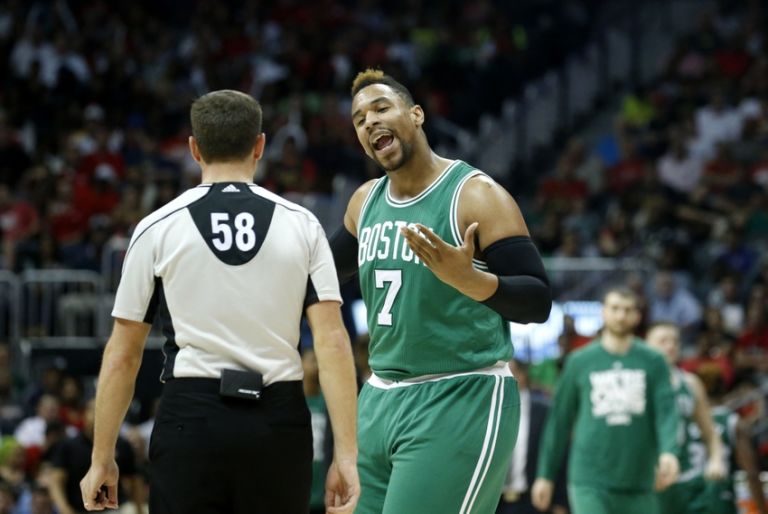The offseason is here, and there are a lot of questions with Boston’s roster as Danny Ainge dives into the next chapter of this rebuilding process. In this series, I’ll be looking at what the Celtics choices are with certain players considering their past performance and where the team is going. We continue with one of the team’s restricted free agents, Jared Sullinger
At a glance:
2015-16 regular statistics: 10.3 ppg, 8.3 reb, 3.5 ast. 43.5 fg%, 28.3% 3pt, 64.0% FT
2015-16 advanced statistics: 47.6% true shooting, 18.7% rebound percentage, 10.4% turnover rate, 21.8% usage, 16.7 PER
Age to start next season: 24
Last season’s salary: $2,269,260
Qualifying offer: $4,433,683
How he played this season
Sully had a solid season for the Celtics, giving the team his typical tenacity on the boards and leading the Celtics in all raw and advanced rebounding categories. He was also the team leader in defensive win shares this year, showing that despite was a rocky year shooting and scoring, he generally had a positive impact on games.
However, there remain many questions about Sullinger after this season. The most obvious for him is whether he can get into the type of physical condition necessary to progress as a player. Part of his problem in the playoffs is that he didn’t have the lateral quickness to stay with Atlanta’s forwards. Can Sullinger truly take that next step conditioning-wise that eliminates that issue?
Further, for all his guile on the block and as a rebounder, his face-up game is taking steps backward. His 47.6% true shooting is alarming. A 10% drop in his free throw shooting is especially problematic, and his overall decline from the field saps a key component to his value.
If Boston is looking to space the floor with its bigs, how much will Sullinger be able to do that if he’s unable to play pick-and-pop and be anywhere near reliable from 3? If shooting is such a premium for Boston, is Sullinger’s defense, rebounding, and post play enough to keep him around?
What do the Boston Celtics do with him?
I’d anticipate they make him the qualifying offer. Even if the team makes the upgrades they want, there is still a spot for Sullinger off the bench or as a spot-starter due to injury. The real question is how much will another team offer him, and will Danny Ainge match that offer?
The Celtics can simply make Sully qualifying offer and see if he gets offers within their palatable range. Considering the spike in the cap, it’s hard to anticipate what that number will be (one formula floating out there is to take what you normally think a guy should get, then add 30% because of the new cap scenario), but I’m sure the average annual value will be at least $10 million. There are teams that need rebounding and who’ll have the money to spend. Are the Celtics willing to triple Sullinger’s salary?
My guess is Ainge has a magic number. If a team goes over that with an offer sheet, then Sullinger is gone.
However, there ARE other ways this can go. If the Celtics find themselves in pursuit of two max free agents, they could rescind the offer to Sullinger, rescind his rights, and let him walk in an effort to free up about $5 million in space.
OR…
They could find themselves in a spot where they’ve spent $50 million in cap space and NEED to match a Sullinger offer in order to round out the bench. This scenario depends more on the timing than anything. Sullinger’s cap hold* is $5.6 million, which isn’t horrible. If there are no offers for Sullinger or the offer comes in AFTER bigger free agents are signed, then the Celtics could hold off on a Sullinger decision until then and then give him the $10 million aav contract he’ll probably get on the open market.
Timing is everything in life, and the timing of things here could be a factor in where Sullinger ends up. He’d be a hell of a bench option if the Celtics manage to stack their starting rotation. If the timing, and the signings, work out right, then Sully could be back. But if a team decides they absolutely need Sullinger and decide they want to pay him more than Ainge has set as his worth, then the Celtics could just thank him and let him walk.
*Cap holds are essential salary placeholders on a team’s cap in anticipation of signing one of their impending free agents. This is a mechanism that prevents teams from signing a bunch of free agents before using the Bird Rights to re-sign their own. A much more detailed explanation can be found here
Add The Sports Daily to your Google News Feed!

